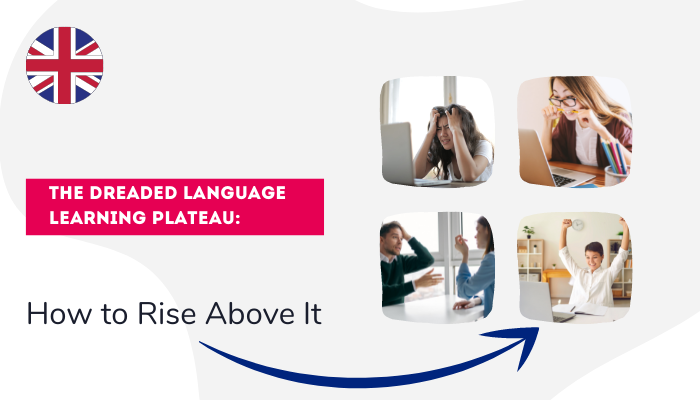


In theory, having learned even some of a language is pretty great.
The view from the intermediate level should be beautiful.
But it’s hard to enjoy the view when you’ve hit an unexpected slump on your way to language fluency.
It’s an experience many have faced before you, but that doesn’t make it any less daunting.
We’re talking about the dreaded language learning plateau.
Yep, your language education was moving along smoothly, and then it suddenly seemed to halt or slow down drastically, right?
You’re not alone.
“Moving Beyond the Intermediate EFL Learning Plateau” by Qing Xu points out that this plateau is unavoidable but can be overcome.
In “Moving Beyond the Plateau: From Intermediate to Advanced Levels in Language Learning,” Professor Jack Richards also describes this unique challenge and related issues.
So it’s time to get past what’s keeping you from fluency.
But before you can move forward, you need to understand what exactly that is.
What’s a Language Learning Plateau?
A language learning plateau occurs when you stop learning as much as quickly. It’s easy to make quick progress early on, but as you learn more, you naturally slow down. Because of this, a language learning plateau frequently occurs when learners reach an intermediate level of language proficiency.
8 Ways to Get Unstuck and Back in the Game
1. Set clear goals.
Once you’ve plateaued, not knowing what to do next can be a big part of the problem. If you don’t know what to do next, your studying will be less focused, so your learning will slow down.
Clear goals will alleviate this by providing you with the focus you need to surge ahead. It’s important to base these goals on your current language level and make them realistic. Setting a specific timeline for your goal is also a good way to keep yourself on the right track.
Overly ambitious goals, like becoming fluent in a week, can demotivate you by setting you up for failure. Set realistic goals that are somewhat challenging but that you know you can achieve.
For instance, you might resolve to learn a new set of vocabulary words or memorize irregular verb conjugations in the next week.
Regardless of what your goals are, having these clear benchmarks will help keep you moving in the right direction.
2. Try new methods.
Since your language learning has slowed down, now is the perfect opportunity to change up whatever you’ve been doing. It’s possible that you’re just stuck in a rut with that method. Trying something new could reinvigorate your language education.
Trying creative language learning methods is a fun way to approach this new phase in your learning process. But regardless of what approach you take, the main goal is to do something different.
One method you may not have tried is double translation. In double translation, you translate a text from one language to another and then back again. Conventionally, you use a dictionary for all of this. However, since you already have language skills, you can skip this with the exception of any words you don’t know. This is a helpful way to build vocabulary and practice your reading and writing skills.
Other approaches may vary based on how you’ve studied in the past. For instance, if you’ve been taking a class or studying a textbook, you might try immersion, language learning software or language learning apps.
Or, you could even continue by taking a course. But instead of taking a course about your target language, you could take a course in your target language.

3. Focus on problem areas.
At the plateau level, bad habits or mistakes start to become more ingrained, so it’s time to correct them.
Taking proficiency tests and assessing your own skills will help you determine what areas you need to work on.
Another way to assess your own skill is to think through what you’re most comfortable with. If you had to communicate with a native speaker, would you feel more comfortable doing it through speaking or writing? Would you feel more comfortable hearing or reading a native speaker’s response? Chances are that the skill you prefer is your stronger skill, so focus on the skill you didn’t choose.
While you may be at an intermediate level overall, chances are that you have some areas that are stronger and some areas that are weaker. Once you find these areas, all you have left to do is work on improving your weak points!
For instance, if you struggle with listening, do more listening exercises. Sure, it may seem obvious, but taking the obvious steps that you may have previously overlooked is important at this point in the process.
Similarly, if you struggle with speaking, find opportunities to speak. You might even start a public speaking club in your target language!
Additionally, if you struggle with a particular grammar rule, you can dedicate more time and effort to finally nailing it down.
Not only will putting time and effort into improving your problem areas improve your language skills, it will also make your confidence skyrocket.
4. Learn more vocabulary.
Limited vocabulary is one of the main hurdles that keeps intermediate learners stuck in the plateau phase.
Fluency in a language requires words—a lot of words. While an intermediate learner usually knows the most common words, the depth and breadth of their vocabulary is usually lacking.
To push away from the plateau, learning vocabulary is essential.
You can choose vocabulary sets by considering what words your vocabulary lacks. For instance, many intermediate learners don’t have as many verbs as would be desirable, so this is a good place to start. You might also be lacking more academic language, so words related to your academic interests could also be beneficial.
Building your vocabulary won’t only help you keep your learning on track, it will also help you communicate more clearly and concisely.
5. Interact with native speakers.
Most language students focus on a generic form of their target language early in their educations. Once you’ve plateaued, the next logical step is to learn to speak more like a native. Interacting with native speakers is terrific for speaking practice, listening practice, vocabulary building and pronunciation improvement.
It can definitely be intimidating to try to speak your target language with a native speaker. Luckily, conversation exchange is an awesome tool for this. Conversation exchange is when you partner with a speaker of your target language. You get practice in your target language, and you give your partner practice in your native language. This is ideal because there’s a strong chance that your partner has also encountered a language learning plateau that they’re trying to escape from.
If you can’t find a native speaker near you, there are plenty of online solutions. Skype language exchange is a popular way to connect with native speakers all over the world. Finding a language exchange partner doesn’t even need to be difficult since there are a wide variety of online resources that will help. Plus, many conversation exchange sites even offer estimated skill levels for participants. If you find someone at an intermediate skill level in your native language, they, too, are probably around the language learning plateau stage.
Once you start speaking your target language with native speakers, your skill and confidence will propel you past the plateau.
6. Build confidence with other learners.
We’ve mentioned confidence a few times before, but it really is that important.
Working on your skills in general will help improve your confidence, but the best way to improve your confidence is to use your target language and use it often.
If you don’t speak, listen to, read and write in your target language often, you won’t have the time to build the confidence you need to continue forward towards fluency. When you’re learning, native-level skills seem impossible. This is why it’s important to use your skills in a supportive context. Get together with or make friends who are at a similar stage in their learning progress. If you’re not sure how to do this, check out some language learning communities.
Together, you can commiserate about the difficulties you’re facing and get some valuable practice in. Even if you make friends with someone learning a different language, there’s nothing to stop you from speaking to them in your target language (and it might even be less daunting this way)! Similarly, if you’re reading or writing alongside a friend, there’s someone there to push you forward if you ever feel like quitting.
As long as you use the language more often, your confidence will grow until full fluency is within reach.
7. Nip discouragement in the bud.
Once your learning slows down, it can be easy to become discouraged. You may even stop trying to improve your language skills. But don’t let discouragement weigh you down! Learning a language is like a marathon. When you start, it’s easy to move quickly. However, the further you go, the more your pace is likely to slow. When things seem impossible, it’s important to remember that you’ve come a long way.
Sure, it was more fun to move faster, but quitting now that the finish line of fluency is in sight is a mistake you may regret. You’ve already put this much work in. Don’t let discouragement stop you from finishing the race!
The road to language fluency may not be a continual rise.
There will definitely be some flat ground along the way.
But if you follow these tips, you can overcome your language learning plateau and continue along your way to fluency with confidence!






















